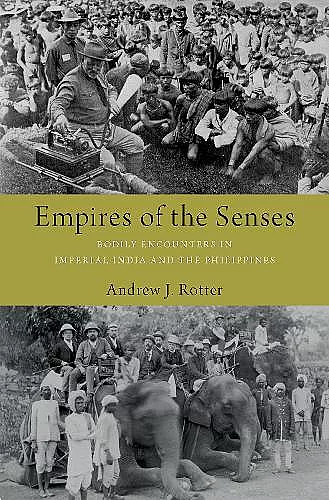Empires of the Senses
Bodily Encounters in Imperial India and the Philippines
Format:Hardback
Publisher:Oxford University Press Inc
Published:16th Aug '19
Currently unavailable, and unfortunately no date known when it will be back

When encountering unfamiliar environments in India and the Philippines, the British and the Americans wrote extensively about the first taste of mango and meat spiced with cumin, the smell of excrement and coconut oil, the feel of humidity and rough cloth against skin, the sound of bells and insects, and the appearance of dark-skinned natives and lepers. So too did the colonial subjects they encountered perceive the agents of empire through their senses and their skins. Empire of course involved economics, geopolitics, violence, a desire for order and greatness, a craving for excitement and adventure. It also involved an encounter between authorities and subjects, an everyday process of social interaction, political negotiation, policing, schooling, and healing. While these all concerned what people thought about each other, perceptions of others, as Andrew Rotter shows, were also formed through seeing, hearing, touching, smelling, and tasting. In this book, Rotter offers a sensory history of the British in India from the formal imposition of their rule to its end (1857-1947) and the Americans in the Philippines from annexation to independence (1898-1946). The British and the Americans saw themselves as the civilizers of what they judged backward societies, and they believed that a vital part of the civilizing process was to properly prioritize the senses and to ensure them against offense or affront. Societies that looked shabby, were noisy and smelly, felt wrong, and consumed unwholesome food in unmannerly ways were unfit for self-government. It was the duty of allegedly more sensorily advanced Anglo-Americans to educate them before formally withdrawing their power. Indians and Filipinos had different ideas of what constituted sensory civilization and to some extent resisted imperial efforts to impose their own versions. What eventually emerged were compromises between these nations' sensory regimes. A fascinating and original comparative work, Empires of the Senses offers new perspectives on imperial history.
Empires of the Senses is principally a work of synthesis and elaboration, brilliantly building on and extending these scattered earlier studies of the senses and sensibilities of empire. * Warwick Anderson, University of Sydney, Journal of Interdisciplinary History, Volume 52, Number 2 *
Empires of the Senses is a sharp, methodologically interesting, and generative work....Reading Rotter's sensory history is like watching a familiar film in 3D for the first time. The details pop out and writhe expressively. Through judicious quotation, Rotter brings to life the colonizers' experiences, offering a chapter each on the five senses plus thematic chapters on civilization, war, and decolonization. This is a richly detailed, fluidly written book. * Daniel Immerwahr, Journal of Social History *
This book stinks! Full of aromas and flavors, textures and tones, Empires of the Senses offers a beautifully written model for new ways of thinking critically about colonialism, power, and everyday life. A remarkable achievement by one of our most creative and provocative historians at the top of his game. * Christopher Capozzola, Massachusetts Institute of Technology *
Andrew Rotter's Empires of the Senses is a tour de force not only for the history of imperialism and empire but also for sensory history generally. Rotter is the first historian of empire to apply the insights of sensory history, and he has produced a seminal book. * Mark Smith, author of The Smell of Battle, The Taste of Siege *
In this innovative contribution to comparative colonial history Andy Rotter opens up empire to the history of the senses. One of the joys of the book is that he is alive to the tragi-comic nature of the imperialist attempt to 'civilize' the vibrant sensory world of India and the Philippines. Empires of the Senses convincingly makes the case that the senses were central to the project of building and resisting an empire and will become essential reading for anyone seeking to deepen their understanding of the colonial experience. * Lizzie Collingham, author of Imperial Bodies: The Physical Experience of the Raj, c.1800-1947 *
ISBN: 9780190924706
Dimensions: 239mm x 157mm x 28mm
Weight: 703g
388 pages